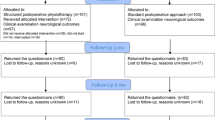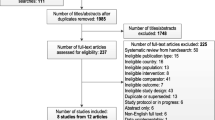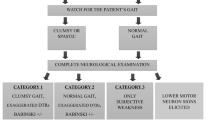Abstract
Purpose
The optimal management of patients with compressive radiculopathy with motor deficit (CRMD) is controversial. Our goal was to provide evidence on the impact of the spine surgeons’ experience on surgical planning and timing.
Methods
Spine surgeons were invited to participate in a 5-item online survey. A literature review was carried out.
Results
Of the 94 spine surgeons who responded to the survey, 70% would operate early on a patient with acute CRMD, but only 48% would do so if the radicular pain had resolved. Surgeons with more than 15 years of experience chose more conservative options. Twenty published studies were selected in the literature review.
Conclusion
The optimal management of patients with compressive radiculopathy associated with a non-progressive motor loss remains unknown. The results of our survey show that surgeons with extensive surgical experience take a more conservative and cautious approach.




Similar content being viewed by others
References
Sharma H, Lee SWJ, Cole AA (2012) The management of weakness caused by lumbar and lumbosacral nerve root compression. J Bone Joint Surg Br Vol 94-B(11):1442–1447
Jägersberg M, Tessitore E (2019) Indications for emergency surgical treatment. Spine surgery [Internet]. Springer International Publishing, Cham, pp 9–15. https://doi.org/10.1007/978-3-319-98875-7_2
Ahn UM, Ahn NU, Buchowski JM, Garrett ES, Sieber AN, Kostuik JP (2000) Cauda equina syndrome secondary to lumbar disc herniation. Spine (Phila Pa 1976) [Internet] 25(12):1515–1522. https://doi.org/10.1097/00007632-200006150-00010
Kreiner DS, Hwang SW, Easa JE, Resnick DK, Baisden JL, Bess S et al (2014) An evidence-based clinical guideline for the diagnosis and treatment of lumbar disc herniation with radiculopathy. Spine J [Internet] 14(1):180–191. https://doi.org/10.1016/j.spinee.2013.08.003
Clark R, Weber RP, Kahwati L (2020) surgical management of lumbar radiculopathy: a systematic review. J Gen Intern Med 35(3):855–864
Arts MP, Peul WC, Koes BW, Thomeer RTWM (2008) Management of sciatica due to lumbar disc herniation in the Netherlands: a survey among spine surgeons. J Neurosurg Spine 9(1):32–39
Lorio M, Kim C, Araghi A, Inzana J, Yue JJ (2020) International society for the advancement of spine surgery policy 2019—surgical treatment of lumbar disc herniation with radiculopathy. Int J Spine Surg 14(1):1–17
Weinstein JN, Lurie JD, Tosteson TD, Tosteson ANA (2009) NIH public access surgical versus non-operative treatment for lumbar disc herniation : four-year results for the spine patient outcomes research trial (SPORT). Spine (Phila Pa 1976) 33(25):2789–2800
Zhang X, Zhang Z, Wen J, Lu J, Sun Y, Sang D (2018) The effectiveness of therapeutic strategies for patients with radiculopathy: A network meta-analysis. Mol Pain 14(10):174480691876897
Akuthota V, Marshall B, Boimbo S, Osborne MC, Garvan CS, Garvan GJ et al (2019) Clinical course of motor deficits from lumbosacral radiculopathy due to disk herniation. PM R 11(8):807–814
Dubourg G, Rozenberg S, Fautrel B, Valls-Bellec I, Bissery A, Lang T et al (2002) A Pilot study on the recovery from paresis after lumbar disc herniation. Spine (Phila Pa 1976) [Internet] 27(13):1426–1431. https://doi.org/10.1097/00007632-200207010-00010
Petr O, Glodny B, Brawanski K, Kerschbaumer J, Freyschlag C, Pinggera D et al (2019) Immediate versus delayed surgical treatment of lumbar disc herniation for acute motor deficits: the impact of surgical timing on functional outcome. Spine (Phila Pa 1976) 44(7):454–463
Nakashima H, Ishikawa Y, Kanemura T, Kato F, Satake K, Ito K et al (2020) Neurological function following early versus delayed decompression surgery for drop foot caused by lumbar degenerative diseases. J Clin Neurosci [Internet] 72:39–42. https://doi.org/10.1016/j.jocn.2020.01.039
Kögl N, Brawanski K, Girod PP, Petr O, Thomé C (2021) Early surgery determines recovery of motor deficits in lumbar disc herniations—a prospective single-center study. Acta Neurochir (Wien) 163(1):275–280
Guigui P, Benoist M, Delecourt C, Delhoume J, Deburge A (1998) Motor deficit in lumbar spinal stenosis: a retrospective study of a series of 50 patients. J Spinal Disord 11(4):283–288
Takenaka S, Aono H (2017) Prediction of postoperative clinical recovery of drop foot attributable to lumbar degenerative diseases, via a bayesian network. Clin Orthop Relat Res 475(3):872–880
Aono H, Iwasaki M, Ohwada T, Okuda S, Hosono N, Fuji T et al (2007) Surgical outcome of drop foot caused by degenerative lumbar diseases. Spine (Phila Pa 1976) 32(8):262–266
Liu K, Zhu W, Shi J, Jia L, Shi G, Wang Y et al (2013) Foot drop caused by lumbar degenerative disease: clinical features, prognostic factors of surgical outcome and clinical stage. PLoS ONE 8(11):1–6
Postacchini F, Giannicola G, Cinotti G (2002) Recovery of motor deficits after microdiscectomy for lumbar disc herniation. J Bone Joint Surg Br Vol 84(7):1040–1045
Aono H, Nagamoto Y, Tobimatsu H, Takenaka S, Iwasaki M (2014) Surgical outcomes for painless drop foot due to degenerative lumbar disorders. J Spinal Disord Tech 27(7):E258–E261
Acknowledgements
We thank all respondent surgeons for their voluntary participation in our survey. We would also like to thank the Bellvitge University Hospital Clinical Research Support Unit, IDIBELL and CERCA Program/Generalitat de Catalunya for institutional support.
Funding
No funding was received for conducting this study.
Author information
Authors and Affiliations
Corresponding author
Ethics declarations
Conflict of interest
The authors have no competing interests to declare that are relevant to the content of this article.
Ethical approval
All procedures performed in studies involving human participants were in accordance with the ethical standards of the institutional and/or national research committee and with the 1964 Helsinki declaration and its later amendments or comparable ethical standards.
Additional information
Publisher's Note
Springer Nature remains neutral with regard to jurisdictional claims in published maps and institutional affiliations.
Rights and permissions
Springer Nature or its licensor (e.g. a society or other partner) holds exclusive rights to this article under a publishing agreement with the author(s) or other rightsholder(s); author self-archiving of the accepted manuscript version of this article is solely governed by the terms of such publishing agreement and applicable law.
About this article
Cite this article
Garreta-Catala, I., Suarez-Perez, M., Gonzalez-Cañas, L. et al. Radiculopathy with motor deficit: a cross-sectional study of the impact of the surgeon’s experience on the indication and timing of surgical treatment. Eur J Orthop Surg Traumatol 34, 191–199 (2024). https://doi.org/10.1007/s00590-023-03632-9
Received:
Accepted:
Published:
Issue Date:
DOI: https://doi.org/10.1007/s00590-023-03632-9




